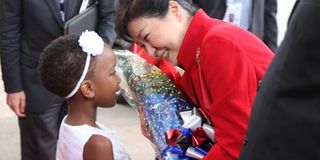Uganda to cut defence ties with Korea

South Korean president, Park Geun-Hye, the receives a banquet of flowers from Megan Makanga at State House Entebbe yesterday. PHOTO BY STEPHEN WANDERA.
What you need to know:
Concerned. Uganda, which has previously had military relations with North Korea, says it is concerned over the country’s long-standing nuclear activities.
ENTEBBE. Uganda will cut defence and security ties with North Korea in compliance with a broad array of the UN sanctions imposed on Pyongyang in March for its nuclear test and ballistic missile launch.
Former Foreign Affairs minister Sam Kutesa told journalists yesterday at State House Entebbe after President Museveni and North Korea’s archrival - the visiting South Korean leader Ms Park Geun-Hye held bilateral talks on defence and trade.
The two nations later signed a Memorandum of Understanding which spells out areas of cooperation.
Former Defense state minister Jeje Odongo signed on behalf of Uganda while South Korea deputy minister of defense, Hwang In Muo signed for his country.
Signed MoUs
They signed under the watchful eye of the two presidents.
“Following the UN sanctions, we are disengaging our relations with North Korea. We do not support proliferation of nuclear weapons,” Mr Kutesa said.
Mr Kutesa was responding to a question on whether the government would continue working with North Korea which has been offering military and police training to Uganda.
He said Uganda supports use of nuclear for energy but instead urged those with nuclear weapons to destroy them.
In March, the UN Security Council imposed sanctions on North Korea after it launched ballistic missiles.
The sanctions prohibit all UN member states from engaging in activities such as trade or transfer of technology that could enable the nation’s missile and nuclear programmes.
A report by the Royal United Service Institute for Defence and Security Studies, a global security think- tank released last month, listed Uganda among the top five countries that seem not ready to cut military ties with North Korea despite the UN restrictions.
After the bilateral talks between presidents Museveni and Geun-Hye, 10 MoUs were signed between the two countries.
These MoUs were on defence, social welfare, rural development, health, agriculture, cooperatives, information and communications technology, science and technology, diplomacy and consultations and energy.
President Museveni said during a luncheon that “African patriots” support the peaceful unification of North and South Korea.
“The Korean people are an ancient people whose specific identity can be traced as far back as 1392. Unfortunately, your nation was divided at the end of the second World War,” he said.
President Geun-Hye arrived in Uganda last Saturday for a three-day visit pledging to support Uganda’s Vision 2040, a package of strategies that plan to transform Uganda from peasantry into a modern country.
The two presidents will today to travel to Mpigi in Kampiringisa to tour South Korean agricultural projects.
Relations
Training: Previously Uganda has hosted 45 North Koreans security personnel to provide police training, according to a February report by a United Nations panel of experts. Handling guns: Another report by the panel last year said North Koreans trained Ugandan police on the use of AK-47s and pistols.
Abstained on voting: Uganda abstained from voting on all nine UN General Assembly resolutions on North Korean human rights for which votes were counted since 2005, a record mirrored by countries including India, Ethiopia, Nigeria, Mali and Qatar.




